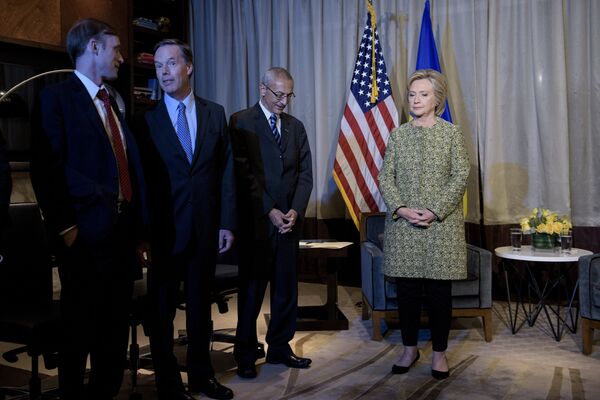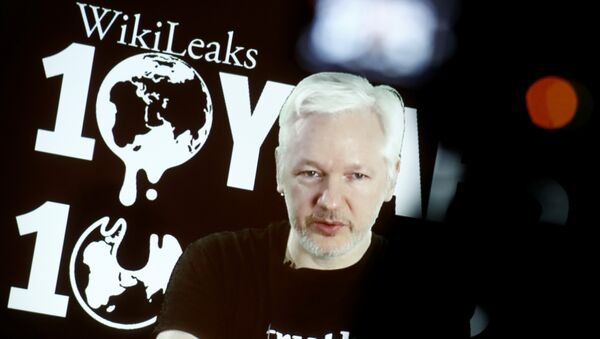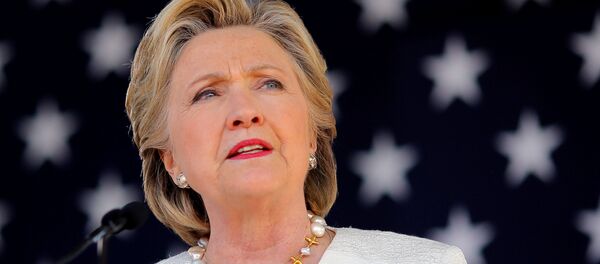The media organization has released tens of thousands of documents relating to the US Democratic Party over the course of the year, including emails from Democratic candidate Hillary Clinton's campaign manager, John Podesta.

The DNC Leaks
WikiLeaks' relationship with the election began in July when the organization published the first batch of the Democratic National Committee (DNC) leaks.
The first batch of DNC leaks consisted of more than 19,000 emails and 8,000 attachments from the US Democratic Party's governing body, featuring emails from seven key DNC staff members during the party's primary election campaign.
Previous DNC chair Debbie Wasserman Schultz had to resign for tipping scales against Bernie, her replacement Donna Brazille did the same
— Oliver West (@OliverWest100) October 31, 2016
The leaks revealed a sometimes hostile attitude towards the campaign of Democratic candidate Bernie Sanders from members of the DNC, leading to suggestions the committee was betraying its neutrality and actively supporting Hillary Clinton.
The leaks led to the resignation of DNC chair Debbie Wasserman Schultz before the party's convention, while CEO Amy Dacey, CFO Brad Marshall, and Communications Director Luis Miranda also resigned in the wake of the drama, with Wasserman Schultz apologizing to the Sanders campaign.
RELEASE: 8263 new emails from the DNC #DNCLeak2 #feelthebern #imwithher #demexithttps://t.co/ftwH5t57lj pic.twitter.com/EljYHE0n9E
— WikiLeaks (@wikileaks) November 7, 2016
On the eve of the election, on November 6, WikiLeaks also released a second batch of DNC leaks, consisting of more than 8,000 emails.
The Podesta Emails
WikiLeaks' publishing of sensitive Democratic Party material continued in October with the release of the more than 20,000 pages of emails from the Gmail account of Hillary Clinton's campaign chairman, John Podesta.
The leaks, which were released in daily batches throughout October and early November, gave an insight into the behind-the-scenes operation of Clinton's campaign.
The DNC, Clinton adm. & corporate media are scapegoating Russia to avoid discussing immense amounts of corruption in our gov't. #wikileaks
— Ajamu Baraka (@ajamubaraka) November 5, 2016
They raised concerns about foreign donations to the Clinton Foundation, Hillary Clinton's paid relationship with Wall Street organizations and collusion between the Clinton campaign and US mainstream media.
Russian Propaganda Arm?
The US government officially blamed Russia for deploying the hackers to meddle with the US election, Clinton campaign spokesperson Glen Chaplin described WikiLeaks as a Russian "propaganda arm," while Clinton herself went a step further and blamed Russian President Vladimir Putin for the hacks.
"What is really important about WikiLeaks is that the Russian government has engaged in espionage against Americans. They have hacked American websites, American accounts of private people, of institutions. Then they have given that information to WikiLeaks for the purpose of putting it on the internet. This has come from the highest levels of the Russian government. Clearly from Putin himself in an effort, as 17 of our intelligence agencies have confirmed, to influence our election," Clinton said.
WikiLeaks has not revealed the identity of the hackers, but editor-in-chief Julian Assange said there was no proof Russia was behind the attack, saying the Russian government had no involvement.
Once you start haggling over what you meant in
— martha maccallum (@marthamaccallum) November 2, 2016
an email, the idea that it was written by the Russians kind of goes out the
window #Podesta
For its part, Moscow has also denied any involvement in the hacks and collusion with WikiLeaks, with Putin describing the allegations as "entirely unrealistic."
Meanwhile in a Sputnik exclusive, former British Ambassador to Uzbekistan, Craig Murray, rubbished US claims of Russian involvement in the leaks, saying the DNC hacks were conducted by a Washington insider.
WikiLeaks Under Attack
The publishing of the Democratic Party files and allegations of Russian collusion also saw WikiLeaks come under attack throughout the election campaign.
On October 17, ten days after WikiLeaks began publishing daily batches of the Podesta emails, Julian Assange's Internet connection in London's Ecuadorian embassy was temporarily cut off by the Ecuadorian government.
After releasing a 2nd batch of DNC leaks, Wikileaks and Twitter were taken offline for about 30 min. #twitterdown #wikileaksdown #dncleak2
— veegaa4 (@veegaa4) November 7, 2016
The government said the action was taken directly because of Assange's role in helping WikiLeaks publish Democratic Party documents, which were "impacting on the US election campaign."
The whistleblowing platform also became the target of alleged cyberattacks itself, with WikiLeaks saying it had been hit with a "targeted" denial-of-service (DoS) attack, just hours after releasing its second batch of DNC files on November 6.




